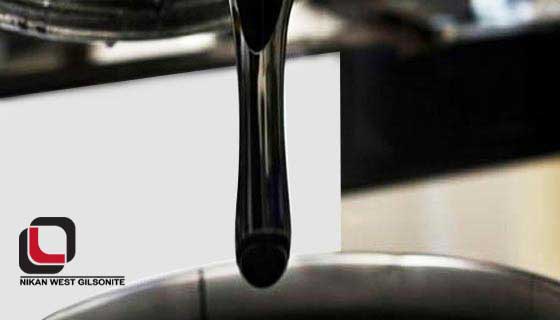In this article from Nikan west company the gilsonite producer in Iran, we talk about the Investigation of common bitumen tests for road construction bitumen.
what is the Road construction bitumen ?
Road construction bitumen is one of the most important products in the road construction industry and asphalting streets, highways and suburban roads. Road bitumen can be made from a variety of natural bitumen and refinery bitumen. Each of these has special properties and has its own advantages and disadvantages.
The bitumen used in the road construction industry must have features that optimize its use. The viscosity of bitumen, the safety of bitumen in terms of ignition point, bitumen penetration rate, bitumen flexibility, bitumen solubility, temperature effect on bitumen and bitumen softening point are among the important issues in this field and are examined by conventional bitumen tests.
Bitumen viscosity
Viscosity means elasticity. Bitumen has a different viscosity at each temperature. Therefore, in order to measure bitumen viscosity, a standard temperature must be specified for the test conditions.
To test bitumen viscosity, a tool called a viscometer can be used. A viscometer is a capillary tube in which bitumen flows at a standard temperature of 60 Celsius degrees and vacuum conditions; and the basis for testing is the time it takes for bitumen to reach the starting point.
Of course, this time is placed in a complex mathematical formula, and finally the number obtained shows the rate of viscosity. Also, if it is not possible to create vacuum conditions. By setting the bitumen temperature to 135. C, this number can be calculated with relatively good accuracy.

Bitumen ignition temperature
This test is very important in the construction of road bitumen; because it deals directly with road safety against ignition. Simply put, in this test, the bitumen heats up to the point of smoke and ignition, and this point is called the bitumen ignition point.
The device used to test this is a brass bowl that lights a flame and heats the bitumen inside. At the top of the rice bowl, a flame is created at regular intervals. Whenever a high flame causes bitumen vapors to ignite; that degree of bitumen temperature is called the flash point.
Regardless of the effect on other properties, the higher the flame point of the bitumen; the safer the asphalt is made of it.
Bitumen penetration rate
In the general language, this test measures the consistency of bitumen. The higher the consistency of the bitumen used, the less permeable it will be to environmental factors.
The result of this test is announced based on a few tenths of a millimeter. To perform this test under laboratory conditions (temperature, pressure, etc.), a special needle is placed perpendicular to the surface of the bitumen and its penetration rate in the bitumen is checked for 5 seconds. Naturally, the lower the number; the bitumen has a higher consistency.
Bitumen flexibility
One of the most common causes of asphalt cracking or isogum cracking is low bitumen flexibility. The more flexible the bitumen, the more ductile it will be in tension. In contrast to traction, it stretches instead of breaking. This test is also able to check the flexibility of bitumen at constant temperature and constant pressure.
The standard laboratory conditions for this test are 15 C; where the bitumen is drawn at a rate of 5 cm per minute. The final result of the test is calculated by measuring the length of the sample bitumen at the moment of separation and based on centimeters.
Other bitumen tests
The effect of temperature on bitumen, the softening point of bitumen, the solubility of bitumen and the presence of insoluble in bitumen are other tests that are effective in measuring the final quality of road bitumen.


